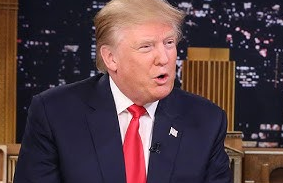The political resurgence of President-elect Donald Trump has wreaked havoc on the Democratic Party while simultaneously leaving Hollywood in disarray. Once a powerful medium for shaping mainstream cultural discourse, late-night television has now fallen victim to Trump's re-emergence on the political scene. Major hosts like Stephen Colbert, Jimmy Kimmel, and Jimmy Fallon are enduring a dramatic drop in ratings and losing the cultural influence they once wielded.
A recent analysis by the Media Research Center during the height of the 2024 election campaign reveals that late-night comedians have fixated on Trump, delivering around 1,463 jokes targeting both Trump and Kamala Harris from September 3 to October 25. A striking 98 percent of these quips were aimed at Trump himself, while vice-presidential candidate JD Vance bore the brunt of 78 percent of the jokes directed at running mates.
However, the relentless barrage of Trump-focused humor appears to have alienated audiences, evidenced by the reports of sinking viewership. This trend has prompted discussions around what some have called “Trump Derangement Syndrome,” a phenomenon where content that heavily critiques Trump fails to resonate with the everyday American viewer. As a result, loyal audiences are tuning out, leading to a precarious situation for late-night shows vying for relevance.
Adding to the narrative of decline is the Democratic Party’s ongoing post-election turmoil. With a lack of strong leadership and no prominent candidate to step into the limelight, the party’s woes reflect the challenges faced by Hollywood figures. Promises from celebrities like Alec Baldwin and Cher to relocate to Canada if Trump won have proven to be ironic, as those commitments have yet to manifest.
The downturn in late-night television signals a broader shift in cultural attitudes. With Trump's return to politics, the media and entertainment landscape is evolving, compelling late-night comedy to rethink its approach. To regain its footing in a fragmented media environment, the genre may need to move away from divisive narratives that have contributed to its current struggles.




















